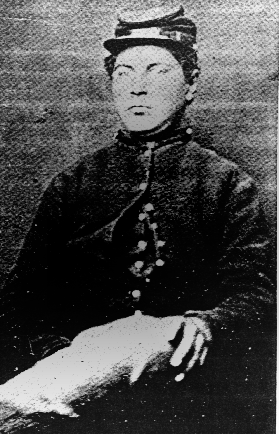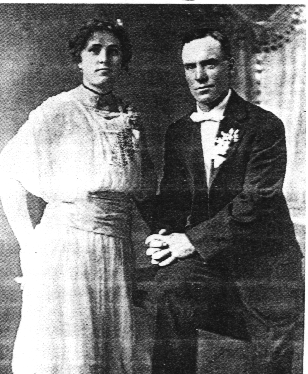REMINISCENCES OF MY PARENTS,
JAMES ALBERT WEST and PHOEBE WEST
by
Dessie Ann Jones
The lure of the west led my parents to Nebraska, Pa came in 1871. He came alone on the train and took a homestead near what is now Bellwood but what at that time was unbroken prairie. Friends from Michigan had come a year and two years before, and had located here. These friends, Olneys and Gerards, remained staunch friends as long as they lived. After taking the homestead, Pa returned to Michigan. The next February he came and brought Mother and the two children, Minnie and Mattie.
James West
Mr. Olney met them in Columbus and took them to the Olney home until they could get a house built. It was very cold for sometime. One day when Pa and Mr. Olney went to Columbus for provisions, Pa froze his ears. Mother often told me how heart sick she was even though their friends were very kind to them. She longed for her old home. The house seemed so dark and dreary. They helped furnish food while they stayed at the Olneys. When they came, they brought bedding, one rocking chair, about $200, blacksmith tools, and a barrel or dried fruit.
In March, Pa built a frame house 12 ft. by 16 ft. It had a floor, windows, and a door, but no ceiling or plaster. They lived in it, in this condition, for the first winter but the next summer they put in a ceiling, lathed and plastered, and built on an adobe bedroom. They chose a low place to get the sod where the grass had made good roots or was a mass of roots.
Pa set up his anvil and had a big box which served him as a blacksmith shop. He worked for the other farmers, who paid him with all kinds of things, in fact everything from catfish to breaking sod. They had no horses or stock of any kind when they started.
Hank Wilson hired Pa to break 80 acres. He agreed to have the breaking done by the 4th of July and to begin the 1st of May. Mr. Wilson was to give him a team of oxen, chain, & yoke far the work. Pa hired Jim Brown to do the breaking for $16.00 per month. The first day Jim worked he was disgusted and tired out. Pa went out with him the second day to find out what was the trouble. He adjusted the plow lay and turned the edge. After that Jim thought it was the easiest work he had ever done. The oxen break 2 or 2 1/2 acres a day. When the Fourth was drawing near, Pa could see that Jim would not be able to get through, so he persuaded several men who owed him for work, to help. Jim finished up the breaking. Pa had Jim break ten acres for another man and in that way got enough money to pay Jim for his work, and had enough left to buy a pair of boots.
They bought their first cow of Hank Wilson for $40.00. Pa was to pay for the cow by doing blacksmithing for Mr. Wilson. Mr. Wilson was a very kind man and knew that the children needed plenty of milk. At the end of the year they figured up and Mr. Wilson owed $2.50 for blacksmithing besides the price of the cow.
One day during the second year, some or the neighbors drove in the yard and said, "Where do you want your shop, Al? These neighbors built a shop of sod. Pa bought 50 cedar rails from Miles Warren for 10 cents apiece. He used these for the roof; they put on brush, grass, then sod, and then plastered clay from the bluffs on the roof. This helped to shed the water, and Pa used this shop for years.
The first pig they had, they paid $5.00 for. Mother carried it home in a sack made of an overalls leg. They made the pen for the pig of willows. The first winter they kept their potatoes in a pit which they dug. They put straw in the bottom and then covered them with dirt. They would dig out a bushel or two at a time, These they would put in sacks, put in a chest in the kitchen, and then cover the chest with blankets to keep them from freezing. The only means of heating the house was by cook stove. Severe cold weather caught them once without any fuel, but Pa cut corn stalks, carried them in bundles, and then cut them up so that Mother and the children could put them in the stove. This made a good fire and kept them warm but also busy.
The first year Pa got 20 acres broken and planted it to sod corn. This corn made about 20 bushels to the acre.
One spring when the bridges were out, Pa had to have coal, groceries, a bar of steel, and a whipple tree. He walked the railroad bridge and on to Columbus, made his purchases, and hired them hauled to the edge of the bridge. He carried the things across which required five trips. The bar of steel was the most difficult to carry.
They had good times as well as hard times. They had surprise parties at the homes. One time the folks had been invited to a party. Mother had made a cake. They were ready to go and were waiting for Mr. Gerard to come after them. When Mr. Gerard drove in they began to put on their things. Several more wagons drove in, and they realized the surprise party was to be on them. Pa had been digging a cellar and he knew when they all got in, the floor might break through. They had to wait until he measured and cut willows to brace the floor. Then the party proceeded. Mrs. C. S. Burch was usually the one who proposed the different games. Many times they had oyster stews, taking up a collection to pay for the oysters at the party in advance.
They had to take their wheat to Shell Creek to be ground. One time Pa took his and the miller said he couldn't grind it for two weeks, he had so much ahead. Pa told him he had come from Platte Valley, and must have some ground to take home with him. The miller told him to stay all night and after the others left, he would grind his wheat. So Pa slept first on sacks of wheat, which he found too cold, then on sacks of bran, which were warm. In the morning his wheat was ground but he had to buy materials to make sacks of, as he didn't have enough sacks to hold his bran.
When the folks went to Columbus in spring-wagons with one seat, Minnie and Mattie would sit on straw in the back of the wagon. Sometimes they would see Indians, and the children would jump on the wagon and ride a ways. Pa always warned the children not to say anything to them. I have heard Mother tell about one time when Pa was gone, she looked out the window and saw lots of Indians coming down the road. Her heart almost stood still, because they had heard the Pawnees were on the warpath, but these Indians did not stop.
Each year, Grandma Baker sent a barrel of dried fruit, and always put in presents for the children, candy and cloth for dresses.
The folks went back to Michigan in the fall of 1876. John was born in Michigan. Uncle Edd and Pa drove back to Nebraska. It took them four weeks and 1/2 day. Mother and the children came back on the train. Ella Seabury came with her, Once I asked Pa how he learned to swim. He said, one time when crossing the river hanging onto a plank and kicking, he let go the plank when he thought he could touch bottom, but he was still in deep water, so it meant sink or swim and he swam; and after that he could easily swim.
The folks stayed on the farm for several years. They moved to Rising City in about 1879, I think. Grace was born in Rising City. They moved back to the farm. Minnie was married and moved to Norfolk. Harry was born and six months later George A. was born to Minnie. Minnie passed away when George A. was three days old. Mother brought him home and cared for him for years. Harry and George really kept her busy. They could get into lots of mischief. I often think what a care Mother had, besides her grief for Minnie.
Anna and Harry West
After farming for several years more and fighting grasshoppers and drought, and finally getting discouraged, Pa bought an implement shop in town, and a home. We moved to town when I was a year old. Later, Pa had a blacksmith shop and worked in the shop until after Mother's death in 1921.
Note: Anna Ladwig West is still alive [1998] and living in Nebraska at the age of 104.
Submitted by Dawn Carpenter
Copyright © 1998, Dawn Carpenter
Produced for NEGenWeb by Carolyn Wilkerson

